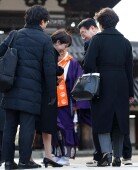[Opinion] Saving Venice
The Renaissance started from Florence, flowed through Rome, and ended in Venice. Masterpieces of Venice in its golden period had a great impact on masters like Titian, Veronese, and Tintoretto. Venice is a birthplace of opera, and the whole city has been designated as a world cultural heritage site. There is no need to explain the beauty of its architecture. Historians say that freedom of publication and the press helped the Renaissance flourish.
The publishing industry in Venice flourished enough to produce more than half of the books published throughout Europe. Even under papal dominance, Venice had the freedom to publish subversive books. If you said, Go to Venice to anti-Catholic protestors, it meant they had better find ideological shelter there. It was because in Venice, the freedom of words and thoughts helped culture flourish. When Goethe visited there in 1787, he applauded it, saying, Everything surrounding me is full of nobility.
Venice is a city built on numerous wooden piles, which have been artificially set up on a vast tract of muddy land. Tourists might forget that the city that is full of beauty and romantic atmosphere is actually the product of a fierce struggle for survival. In 1966, a disaster occurred when sudden tides overwhelmed the city. At that time, each nation actively joined in efforts to save Venice, thinking that the world now had a precious opportunity to pay back its cultural debt to Venice. These days, more than 200 days a year, its water level is higher than that of the land.
Currently, specific efforts are ongoing to protect Venice from experiencing sea level rise and ground sinking. One example is the Moses Project to prevent the inflow of the seawater by raising the height of a water gate. In the past, early pioneers in Venice fought the ocean by themselves. Now, the whole world has joined in the effort. It reminds one of a saying that ones culture never perishes even after death. In the 21st century, which regards culture and knowledge important, is also called the New Renaissance. It is recommended that Korea go back to history books on the Renaissance and learn from it if it wants to be a culture-rich nation and envies Venice.
chanski@donga.com







